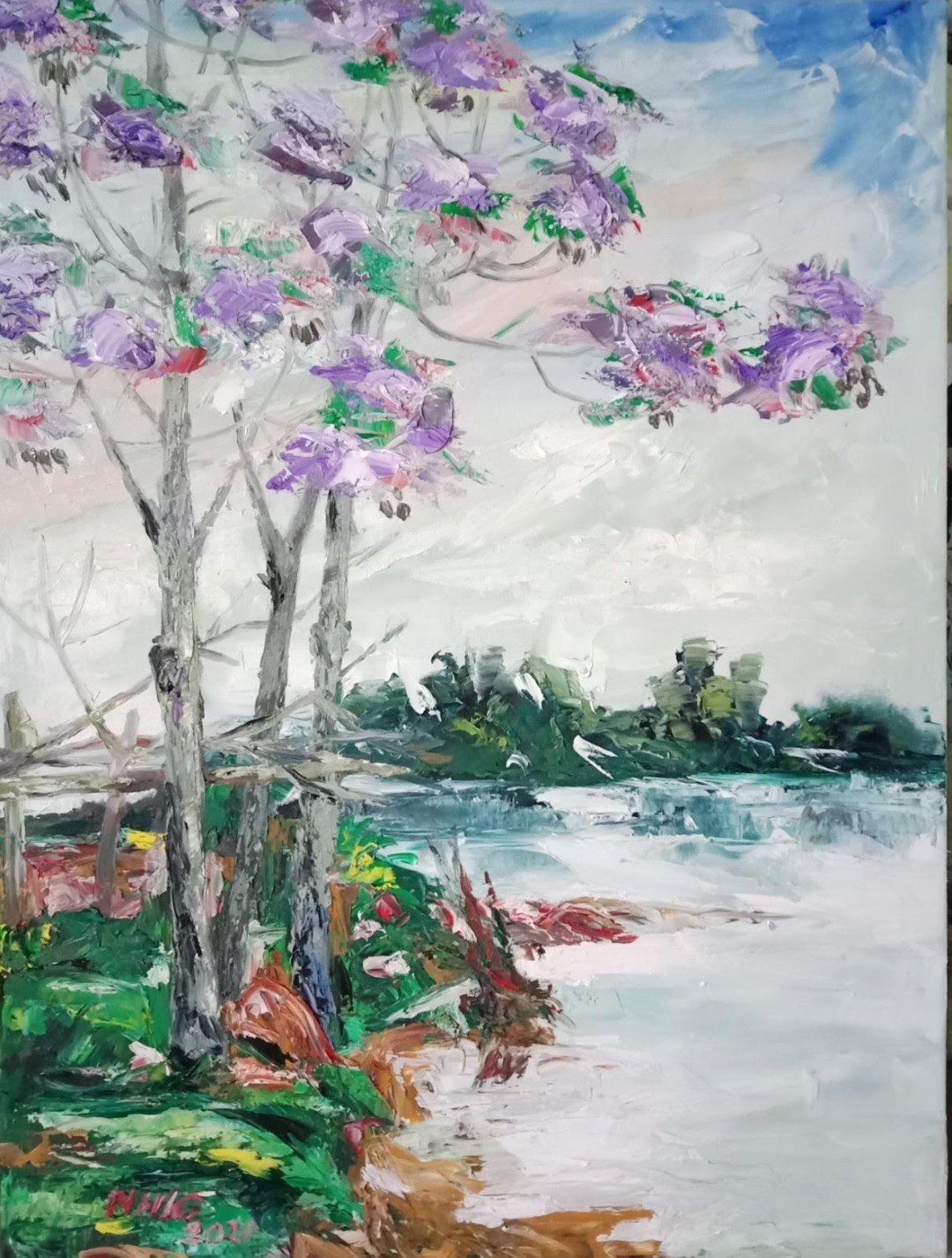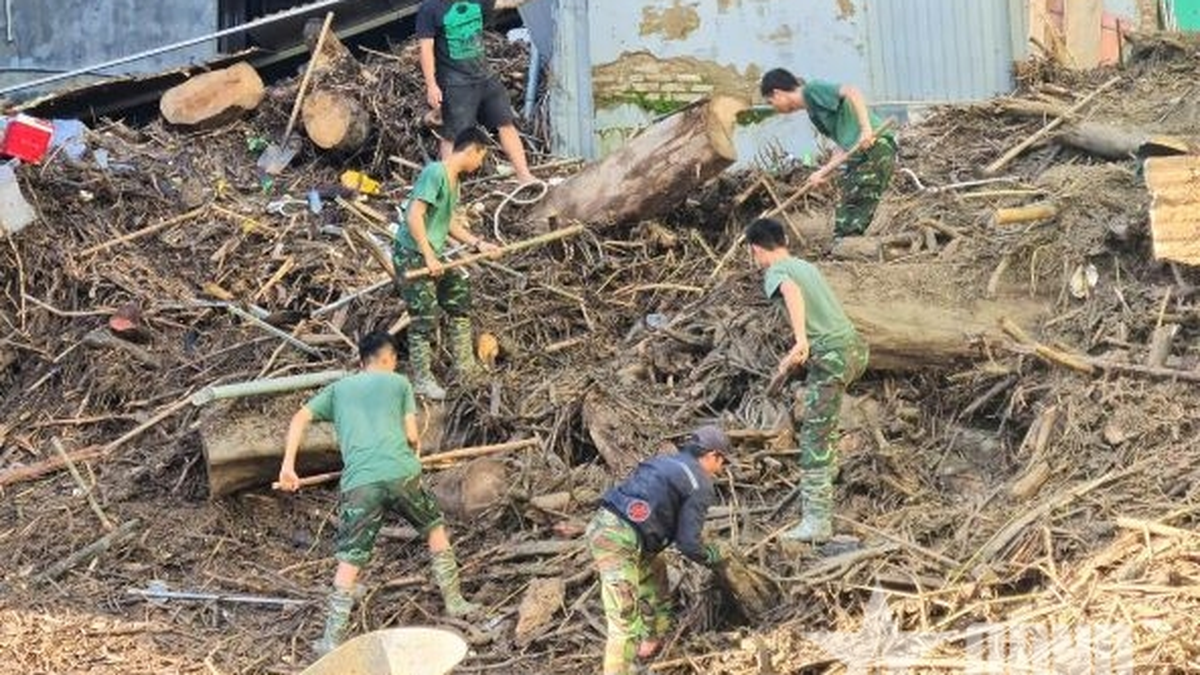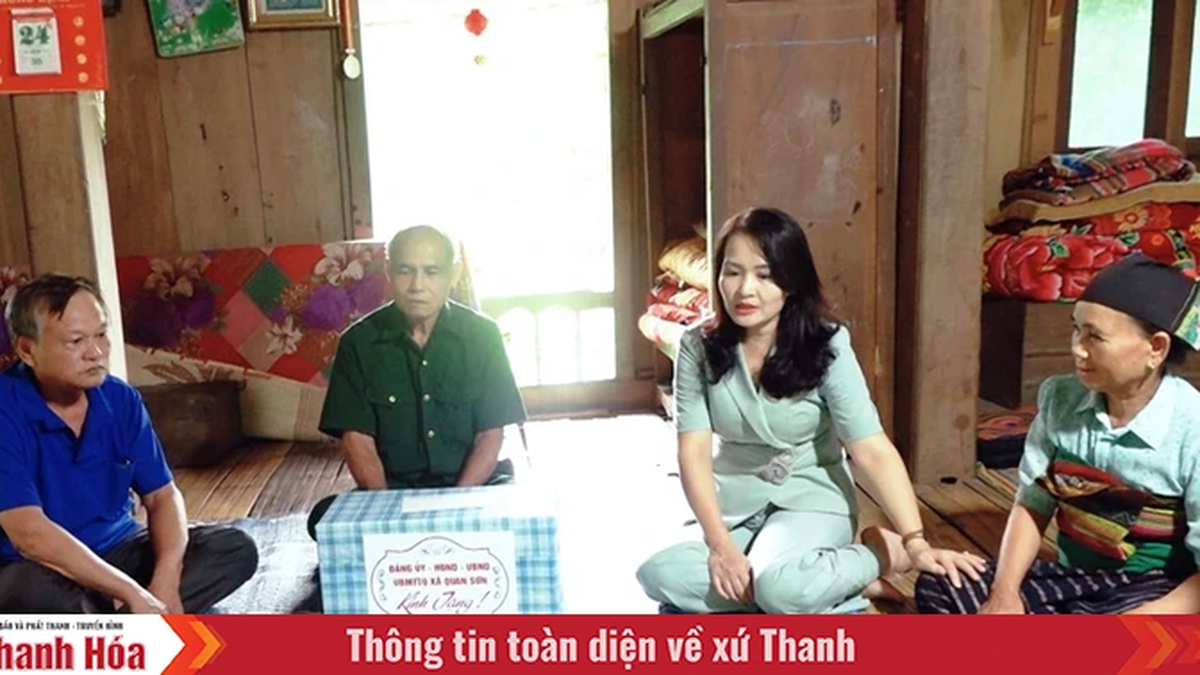That year, more than half a century ago, my grandfather turned fifty, which at that time could be considered old. But he was still very healthy. He often confidently told us: "I still have to live for another thirty years, when your uncle and aunt Huan have children, I will let God take me back to serve you."
My uncle Huan was studying in the fifth grade at the district school, equivalent to the sixth grade now. Yet the whole commune had only five people, of which the only female was Miss Xoan, the youngest daughter of Mr. Kinh, the doctor in the lower hamlet. Miss Xoan was one of the most beautiful girls in the village, and she was also from a well-educated family, so many men and women in the commune wanted to take a look at her for their sons. But it seemed like she had already chosen my uncle Huan as her lover. That was how I, as a child, saw it.
The district school was nearly ten kilometers away from home. Every morning, the uncles and aunts waited for each other to walk together when the village road was still dark. Beneath their feet, they could only see the white soil winding between two rows of bamboo with dense branches and leaves. And above their heads were the curved bamboo shoots hanging down on each other's shoulders, swaying lovingly. Up high in the sky, countless pale stars still appeared, as if they were sleepy. The sky had risen to wash its face at the foot of the river, but they had not yet hidden themselves in the heavens, allowing the dark clouds to glow with a rosy color. It seemed that the stars were also curious and deliberately lingered to peek at the couple who were intoxicated by the scent of the fields and wind, intoxicated by the scent of love. And it seemed that my grandfather was visibly happy when he guessed that the two people were in love with each other. So every morning when he went out to unlock the door for my uncle, he would eagerly step through the two gates after a few small, clear calls from Ms. Xoan. He would stand and watch the two shadows gradually disappear in the cold mist before returning to the house and sitting on the sofa that had been there since my grandfather was a teacher. Then he would pull out a pipe of tobacco that sounded like a firecracker, covering his mouth and slowly exhaling a thin, dreamy cloud of smoke. Perhaps that was the most enjoyable moment of the day for him. Many years later, I still vividly remember in my childhood memories his eyes twinkling with laughter and half-closed eyes watching the milky white smoke drifting out the door every peaceful morning of the past.
Exactly when I was six years old, old enough to go to the village kindergarten class, it was also a memorable milestone for my family. That was during the memorial service for my great-grandfather, my grandfather announced to all the relatives that he would set aside half of the garden to plant xoan trees, so that in ten years there would be enough wood to build a house for my uncle to marry. Then he started to do it. The half of the garden next to the village road was lush with rows of custard apple trees that gave my family many fruits as big as rice bowls every year. However, after a few sessions of hard work, my grandfather cleared them all. Instead, he planted two rows of xoan trees with more than thirty in a row along the edge of the village road. My grandmother regretted the custard apple trees that she still let her go to the fields when the fruit was ripe, and kept nagging my grandfather about his bad temper. When I was in third grade, the row of xoan trees was also three years old. The trunks of each tree were straight and evenly sized like a plow, the layers of leaves crowded together and shiny with a dark green color. Many of the xoan trees had reached above the roof, the first place to receive the rays of dawn sunlight, looking like sparkling golden umbrellas covering the heads of princesses in fairy tales. In the leisurely afternoons, my grandfather often enjoyed walking alone between the rows of xoan trees, stopping from time to time to use his rough old farmer's hands to lovingly caress the tree trunks that were full of sap. At that time, his heart was filled with satisfaction, thinking about the day when he would personally cut down the entire xoan garden and soak it carefully to start building a house for my uncle Huan and his wife. Once, in his excitement, he even pointed to each tree and clearly told me which trees would be used as pillars, which trees would be used as beams, and the remaining trees would be used as rafters. "It will be a five-room house made entirely of the most beautiful shiny pink heart xoan wood in the village." That was the sentence he happily uttered to me many times as an affirmation of his lifelong passion.
That was in the spring and summer when my village was temporarily peaceful, the war had not yet spread, so my family could temporarily have happy days of reunion. The xoan garden grew visibly day by day. Around the end of February to the beginning of March every year, the xoan branches first pushed out countless tiny buds, then, without knowing when, clusters of purple flowers burst into bloom, blending in with the young, wet foliage. For months, my xoan garden was always filled with the gentle scent of xoan flowers. On windy spring nights, the fragrance wafted far and wide, filling several rooms of the house, becoming more and more fragrant as the night went on. Whenever xoan flowers fell all over the walkways, the weather turned sweetly cold and a little drizzle. At that time, no matter how busy my grandmother was, she would take the opportunity to go to the Green Market to buy a few baskets of fish sauce and then come back to pound and ferment it to make dipping sauce for the whole year. She said that the new season of xoan flowers was plump and gave the fish sauce a special fragrance that no other season could match. When the xoan branches were hanging with small round green fruits, it was a sign that summer vacation was coming. Those were the happy days of my childhood, eagerly waiting for each morning and noon, when countless flocks of migratory birds and white-eyes suddenly flew back from somewhere, swooping down all over the garden, then suddenly flying away for no reason. In a moment, they returned and gently landed like a pale yellow smoke from the sky, fluttering over the green xoan tops. Their chirping and the rustling of leaves sounded pleasant to the ears like a gentle country song. If the occasional rumble of cannons had not echoed from somewhere far away, the scene of my village at that time would have been truly peaceful, truly filled with happiness.
I know that summer, my uncle Huan and Miss Xoan officially dated and made a pact with each other. The two of them spent many late nights whispering love in the xoan garden behind the house. Only when the night dew soaked their hair did my uncle gently open the bedroom door, crawl in, and pull the blanket over our heads. When he was excited, he nudged my hips, making my hips ache, and then eagerly whispered: "Do you want Miss Xoan to be your aunt-in-law?". Honestly, at that time, I just wanted to sleep. I remember that at the end of that summer, the two families officially held an engagement ceremony for my uncle and my aunt. If everything was peaceful, we would only have to wait a few more years for the xoan garden to be old enough to cut down wood to build a house, and for my aunt and uncle to both finish their high school degrees, then my uncle would be able to fulfill his dream of bringing her home. But at that time, the war in my village was already very hot. There were small raids where the French sent troops into the village to catch chickens and ducks. Some young men were forced to join the militia. Seeing the unsafe situation, my grandfather secretly sent my uncle Huan to the liberated zone of Zone Four to continue his studies. Miss Xoan, a girl, had to drop out of fifth grade to come home and help with the farm work. Needless to say, my uncle and aunt were sad at that time. The night of their farewell took place under the canopy of the xoan trees, which were in full bloom with their green leaves. I thought that the coming days would be miserable because they missed each other so much that their hearts were burning. The neighbor's chicken crowed several times before my uncle came into the house. He was already buried under the blanket, but he did not sleep. Lying next to me, I heard him sigh and toss and turn. Then the next morning he quietly passed away. I did not expect that to be the last night my uncle and I would sleep together. And my uncle did not expect that it would be the time he left forever. And Miss Xoan did not expect that she would have to cry her eyes out for my uncle for the rest of her life, for the separation of her first love. Then disaster suddenly struck my family.
One morning in early March of the following year, the sky was drizzling, the wind, though late in the season, was still cold and incessantly howling on the tops of the xoan trees that had just sprouted new leaves, the xoan flowers were purple on the tips of the branches, glistening with many drops of water like the tears of relatives crying and saying goodbye to each other. The French suddenly raided the village. My grandfather that year, although only in his fifties, had to grow a beard to fight the raid like most middle-aged men at that time. Even though he was not old, he tried to show that he was old. So that the French would not conscript soldiers or laborers. But my grandfather's beard was jet black. He had little beard on his chin, but his upper lip beard was very thick and curled up on both sides of his mouth. He looked even more fierce and rebellious, not at all old and decrepit. During that raid, they gathered all the villagers in the communal house, declared the establishment of a militia, and looked for people willing to kneel and follow them. Seeing my grandfather's fierce appearance, they appointed him to be the head of the commune committee. My grandfather resolutely resisted to the end, determined to die rather than become a lackey for the enemy. Unable to submit, the French dragged my grandfather out to the village road, pushed him into my family's xoan garden, and shot him many times through the chest. My grandfather fell face down on the garden ground, in front of my grandmother, my grandchildren, and the villagers, who were wailing miserably. In the afternoon, they retreated to the police station, and the villagers helped my grandfather up. His two arms were still tightly wrapped around a young xoan tree. My uncle cried and prayed for a long time before he could free his ten fingers from the tree. From that sacred moment, my whole life I have engraved in my heart that sinewy arm, that hand with ten fingers as hard as iron, that had once gently embraced and comforted me, that had steadfastly clung to the village land all my life to live a decent life, to live according to the Confucian character that my family had cultivated and trained for generations. When the body was placed in the coffin, his eyes were still wide open, and my uncle could not stroke them. My grandmother used both hands to cover his eyes and then prostrated herself, hugging the coffin and crying. After a while, as if by magic, two streams of cloudy tears flowed from the corners of his eyes and flowed through my grandmother's fingers. After a few gentle strokes from her, his eyelids slowly closed. Despite his mangled body, my grandfather's face at that moment became unusually peaceful. At that time, no one had the heart to close the coffin lid. Who could bear to bury an old man who was taking a good afternoon nap? Because there was a rumor that the enemy would sweep in early the next day, that very night, all the villagers and my family held a funeral to bring my grandfather to rest at the family grave in the middle of the field. Surely, during his lifetime, he never thought that when he passed away, his funeral would have to be hastily held on a quiet night without drums or trumpets. And he probably also did not dare to think that when he passed away, the entire village would see him off, mourning and admiring him like a hero who had sacrificed so bravely against the enemy.
A few days later, the bad news reached my uncle Huan. Because the travel between the free zone and the militia zone was too difficult and dangerous, my grandmother did not allow my uncle Huan to return home to mourn his father. A few months later, my uncle sent a letter through a trusted person asking my grandmother and my uncle for permission to drop out of school to join the National Guard. Aunt Xoan also received a letter from my uncle. I did not know what was said in the letter, but I only saw that every day she diligently went to visit my grandmother, helping my grandmother grind rice, scooping duckweed for the pig's nest, just like a good daughter-in-law in my family. Although I was still young at that time, I also noticed that she was like a different person these days, her eyes often looking absentmindedly at somewhere with a look of sometimes distant, sometimes sad. All the innocent and playful village girls of the past were now gone. During that period, my village had never been occupied by the French as they wanted. The situation was always Viet Minh at night, and the militia during the day, confusing until after the Dien Bien Phu victory. Half of the country enjoyed peace and independence. Needless to say, my villagers were happy. But my family, my uncle Huan, never returned. He lies in the middle of the Dien Bien Martyrs' Cemetery. On the wall of the middle room of my house, from then on, there was a certificate of merit from the Fatherland. My grandmother became the mother of a martyr when she was not yet sixty, but her hair had turned white without anyone knowing when. Since that year, Ms. Xoan has been silently mourning my uncle forever in her innocent heart, which had cherished so many beautiful dreams just a few months ago.
When the schools reopened, Ms. Xoan suppressed her sadness and continued to study. There was a change: it was the same path, but now every day she was the only one walking alone, a lonely shadow. Her steps were no longer eager. And her shoulders, which my uncle used to praise without hesitation, were as beautiful as the shoulders of a saint in a religious painting, but now shrunk into a small xoro, unable to avoid the cold chill between the vast sky and earth every morning of autumn dew. After graduating from high school, she continued to study pedagogy and then taught in the district. On Sundays, she still came to my house. My grandmother and she chatted all night like mother and daughter. Many winter nights my grandmother found her wandering in the xoan garden. The cold and frost were so bitter, pitiful were the xoan trees that no longer had green leaves to cover them, standing bare. Her empty soul or the trunks of the xoan trees that were standing bare in the winter wind, who was colder? On nights like that, my grandmother would light incense on the altar of my grandfather and uncle Huan, then sit and lament to herself: “My poor children.” I know that my grandmother advised her many times to start a family. It was only after several years that she finally listened.
One late afternoon of the year, drenched in drizzle and the cold north wind, she came to my house, sobbing, asking my grandmother’s permission to burn incense before the altar of my grandfather and uncle Huan. Then she stood there, hugging my grandmother, crying, unable to speak. My grandmother had to replace her, also crying and choking up, intermittently praying goodbye, asking permission from my grandfather and uncle to let her marry someone. At the end of the following spring, Mr. and Mrs. Lang Kinh held the wedding ceremony for her. I was also present in the group taking her to her husband’s house on the other side of the Cai River. The wedding procession slowly passed through my house’s gate. The bride moved reluctantly, taking short, heavy steps under the shade of the old xoan trees, whose purple flowers were still fluttering on the branches. Suddenly, a breeze blew by, sounding like a sigh from somewhere far away, causing countless purple flowers to fall like rain onto the bride’s hat, clinging tightly to the shoulders of her wedding dress. Miss Xoan absentmindedly looked up with her sad eyes. Up high, the branches of the xoan tree shivered, waving their arms in farewell, along with many green leaves rustling in unison, singing words of blessing that only she could vaguely feel. I followed closely behind her, also vaguely feeling that something sacred had just happened. The purple xoan flowers clung tightly to the bride's body, refusing to fall to the ground. From now on, she would bring them to her husband's house. She would live her whole life in an illusion with the sweet scent of xoan flowers. She would spend her whole life feeling sad every autumn afternoon, gazing at her distant homeland across the river.
The person who told me this story was a little boy back then. Now he is an old man of nearly seventy. He has been away from home for thirty years. It was only a few years ago that I had the opportunity to return to my old hometown. Every step I take on the village road fills my heart with many touching memories. The xoan trees that my grandfather devoted his life to are now lovingly protecting the happiness of a couple! The garden that my family had inherited for generations is now owned by someone else. My presence in this place is now like a stranger. At best, it is still in the dim memories of the old people. Also on that afternoon of that sad pilgrimage, I met my uncle's aunt Xoan right next to the place where the xoan garden used to flourish. Thinking back now only adds to the heavy, bitter sadness. She brought along her grandson, who was about my age at that time. On her head was a mourning scarf. She said her husband had just passed away. She had been an old woman for a long time. Her saintly shoulders seemed to be bowed down by the burden of life. Only her eyes remained the same as before. In them I read the passionate glow of an old, romantic, ever-green garden of xoan trees.
Oh! Our immortal garden of xoan flowers. The garden of memories that defied the vicissitudes of life and death, defied the years of wear and tear. Now this is just a lifeless, empty piece of land at the feet of our niece. She smiled sadly and commented that I looked a lot like my uncle Huan. I also said that she was still the same Miss Xoan from the old xoan garden. It seemed that a familiar floral scent was lingering around us. Was it the scent of the purple xoan flowers that clung to her hat and shoulders that late spring afternoon when I sadly took her to her husband's house that year? Was it the spirit of my grandfather and my uncle Huan that was faintly returning?
My uncle Huan will always be a very young lover. And my sister Xoan, our niece and I are almost done with a human life.
VTK
Source



































































































Comment (0)